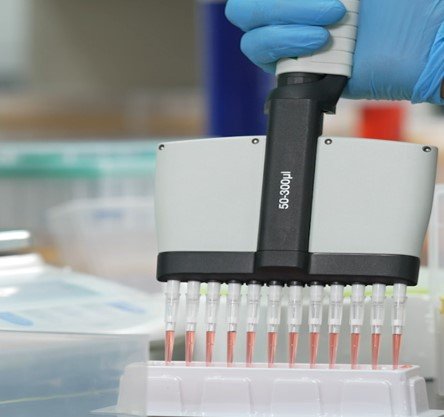Laboratory Generated Aerosols & Sample Crosstalk- A Major Concern
October 01, 2022 | Saturday | Features | By Bijoy Varma
The aerosols from the infectious samples may travel out of the laboratory on the apparel or body of the lab worker in some form and unknowingly be transmitted to other human being or animal who in turn may incubate it to bring out a highly virulent form of the disease. The aerosol from a previous experimental sample can also contaminate subsequent samples due to improper handling. A filter pipette tip can be a savior in such instances thereby preventing untoward incidents and unexpected results.

Aerosol is defined as the dispersion of solid and liquid particles in to the thin air. In a laboratory the pipetting action of pushing and releasing the plunger creates air displacement and formation of an envelope containing miniscule sized liquid and solid particles known as aerosol. These aerosols are free-floating entities and tend to enter the pipette tip shaft through the cone which may contaminate subsequent samples due to the up and down movement of air column inside the pipette assembly while pipetting.
Filter Pipette Tip contains a hydrophobic filter that acts as a barrier by preventing the aerosol movement inside the pipette assembly and thereby protects subsequent samples from cross talk while repetitive air displacement pipetting. The role of filter pipette tips come to the forefront in handling Infectious disease samples, Pure bacterial cultures, Polymerized Chain Reaction (PCR) Toxic & Corrosive agents and Radio-Immunological Assays.
Infectious Disease samples:
Handling infectious laboratory samples have never been an easy task due to the risk of contracting the disease depending on the mode of transmission and spreading amongst others who may come in close vicinity of the concerned lab worker or any medium that finds its way to the unfortunate new host. The aerosols from the infectious samples may travel out of the laboratory on the apparel or body of the lab worker in some form and unknowingly be transmitted to other human being or animal who in turn may incubate it to bring out a highly virulent form of the disease. The aerosol from a previous experimental sample can also contaminate subsequent samples due to improper handling. A filter pipette tip can be a savior in such instances thereby preventing untoward incidents and unexpected results.
Maintenance of Pure Bacterial Cultures:
Every reputed microbiology laboratory procures ATCC pure cultures from Virginia USA and maintains them as pure cultures. For this step, it is necessary to handle these samples with utmost care to prevent cross contamination of the different strains of organisms. Even while performing certain critical experiments the cross contamination of bacterial cultures can be a letdown. The filter tips may be used in maintenance of pure cultures and avoid formation of mixed colonies or too narrowly spaced colonies of multiple organisms.
Polymerized Chain Reaction:
PCR is a highly reliable and widely used technique to amplify extremely small quantities of valuable DNA that may be required for subsequent series of experiments. This DNA sample that is isolated by sensitive and tedious procedures may need to be stored as multiple sample copies in order to have a backup in case of unprecedented experimental errors.
Another important factor is preventing the DNA sample contamination while pipetting the sample that is suspended in molecular biology grade ultrapure water. If the sample to be tested has even a single tiny strand contamination of DNA from the target, the reaction may amplify this DNA and report a false positive reaction. If a worker in a forensic science lab performs PCR on a blood sample, the cross-contamination between samples could lead to false reporting, even if the worker changes pipette tips between samples. A few blood cells could remain in the pipette shaft and then get ejected into the next test sample. The Filter tip is an extremely useful tool in such experiments to prevent erroneous results and false implications.
Toxic, Corrosive & Radio-active agents:
It is highly undesirable to have aerosols with highly toxic chemicals, corrosive elements and radio-active agents. While performing Radio-immuno assays, repetitive pipetting of radio labelled antigens can generate dangerous levels of radio-active aerosols. These radio-active aerosols can be easily inhaled by laboratory workers and scientists who need to take extreme care while handling the above mentioned agents. Again the filter tips can to a great extend prevent the formation of aerosols that are harmful to the mankind and animals in the close vicinity of these laboratories that handle radioactive reagents.
Abdos SuperTM Filter Pipette Tips:
Abdos SuperTM filter tips are fitted with hydrophobic PE filter that is additive free and does not absorb samples. The proprietary pure porous hydrophobic PE filter helps in recovering contamination free samples from wetted filter and does not trap or absorb the liquid into the filter. Abdos SuperTM filter tips are suited for all Biological applications and are Non Cytotoxic (ISO 10993-5MRM, Minimal Essential Media Elution, GLP Compliant) The filter offers 99.9% Bacterial Aerosol Filtration Efficiency (ASTM F21012).
They prevent aerosols from passing through the filter, thus making the pipette shaft contamination free. The filter is Non Hemolytic (Modified ASTM F 756-08 Hemolysis Direct Contact GLP with human blood) All tips are manufactured from ultrapure USP Class VI certified virgin polypropylene to ensure the highest quality, free from heavy metals, natural rubber & inhibitory plasticizers. Abdos SuperTM filter tip has a universal & leak proof fitment and the precise safety gap between liquid & filter offers safety when using electronic pipette and while reverse pipetting. The precise graduation marks are provided for error-free pipetting. The use of the latest injection moulding processes produces high precision thin wall tips with high clarity and the diamond polished moulds ensure an extremely hydrophobic & smooth surface to ensure lowest retention in its class.
Source: Abdos Life science
Author: E. Bijoy Varma
Head-Marketing & Strategy









